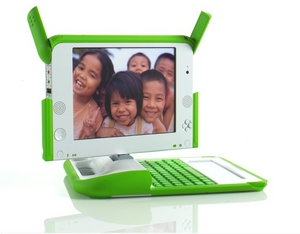The OLPC Wiki/lang-ja: Difference between revisions
No edit summary |
|||
| Line 55: | Line 55: | ||
ラップトップは、世界に開かれた窓であり、考えるための道具です。それらは、独立した相互作用と探索を通じて、すべての子供が学ぶことを学ぶためのすばらしい方法です。 |
ラップトップは、世界に開かれた窓であり、考えるための道具です。それらは、独立した相互作用と探索を通じて、すべての子供が学ぶことを学ぶためのすばらしい方法です。 |
||
OLPCは5つの[[core principles/lang-ja|基本原則]]を支持します。(1) |
OLPCは5つの[[core principles/lang-ja|基本原則]]を支持します。(1)[[core principles/lang-ja#child ownership|子供の所有権]] (2)[[core principles/lang-ja#low ages|低年齢]] (3)[[core principles/lang-ja#saturation|浸透]] (4)[[core principles/lang-ja#connection|接続性]] (5)[[core principles/lang-ja#free and open source|フリーかつオープンソース]]。 |
||
'''さらに多くの[[The Children's Machine|ラップトップ]]''' と'''[[Learning Vision|OLPCの学習に対する考え方]]があります'''。 |
'''さらに多くの[[The Children's Machine|ラップトップ]]''' と'''[[Learning Vision|OLPCの学習に対する考え方]]があります'''。 |
||
| Line 72: | Line 72: | ||
{{anchor|What you'll find inside}} |
{{anchor|What you'll find inside}} |
||
==ここにあるもの== |
==ここにあるもの== |
||
Revision as of 15:23, 13 July 2007
| 翻訳された The OLPC Wiki | 原文 |
| english | عربي | پښتو | български | deutsch | español | français | kreyòl ayisyen | italiano | 日本語 | 한국어 | монгол | Bahasa Melayu | नेपाली | norsk | português | română | русский | kinyarwanda | türkçe | 中文 | 繁體中文 +/- | 変更 |
- This is an on-going translation
OLPC Wikiへようこそ。これはOne Laptop per Childに関連するプロジェクトとコミュニティの共同作業の記録です。現在、9,909のページがあり、千人以上の登録者がいます。ぜひ、参加してアイデアを共有しましょう。
新着情報
- B3マシンが金曜日にケンブリッジのOLPCオフィスに届きました。これは最終形に近いです。Geode LXプロセッサ、改善されたキーボードとタッチパッド、多くの電気的, 機械的改良、そして明るい色のXOロゴが背面に付きました。第一印象は「おぉ!」です。
- 最新リリース: 新しい安定ビルド、Build 406と合わせて新しいファームウェア、Q2C11が公開されました。ぜひマシンを更新してください。これは、自動再インストールイメージを使って簡単にできます。事実上、全システムの機能におよぶ多くの改良があります(リリースノート)。
- 最初のB3直前のマシンが組み立てられて現在動作しています。
- 現地語化: 現在、www.laptop.orgのスペイン語訳が使えます。Xavier Alvarezのたゆまぬ努力に感謝します。その他の言語についてのテンプレートがLocalization/www.laptop.orgに追加されています。また、簡体中国語訳 も利用できます。Scott Zhu、ありがとう。同様にポルトガル語訳(Paulo Drummondに感謝)、 韓国語訳(Do Young-Min, 도 영민に感謝)も使えます。
- B2マシンが開発者プログラムに参加した開発者に配られています。実機がなくてもエミュレータを使って、今使っているコンピュータで実行することもできます。もし実機を持っているなら、BTest-2 リリースノートとB1とB2のデモノートを読んでください。B1のリリースノートはまだここにあります。
週毎のアップデートは「現在のイベント」にあります。
One Laptop per Child(OLPC)について
- 「これは教育のプロジェクトだ。ラップトップのプロジェクトではない。」
ここはOne Laptop per Child(一人の子供に一台のラップトップ; OLPC)のWikiです。この非営利団体の目的は、低価格のノートパソコン— $100 ラップトップ—と世界の子供たちを教育する方法についての革命的な技術を開発することです。私たちのゴールは世界中の子供たちに探求や経験、自己表現の機会を提供することです。
なぜ発展途上国の子供たちにラップトップが必要なのでしょうか。 ラップトップは、世界に開かれた窓であり、考えるための道具です。それらは、独立した相互作用と探索を通じて、すべての子供が学ぶことを学ぶためのすばらしい方法です。
OLPCは5つの基本原則を支持します。(1)子供の所有権 (2)低年齢 (3)浸透 (4)接続性 (5)フリーかつオープンソース。
さらに多くのラップトップ とOLPCの学習に対する考え方があります。
ここにあるもの
このWikiを探検するに当たって、最初にOne Laptop per Childを読むと良いでしょう。ここにはプロジェクトの概要があります。また、よくある質問と答え(FAQ)の一覧、質問の場所、ハードウェア、ソフトウェア、コンテンツ、開発者プログラムについての多くのページ、そして独立したソフトウェア開発Wikiがあります。Sugarは新しいインタフェースで、そのインタフェースガイドラインがあります。配布と国ごとの問題についての議論をするためのページもあります。広範な国のテーブルもあります。最新ビルドは常に ここにあります。最新の安定版は常に ここです。
このWikiについて
このWikiの目的はプロジェクトについての情報を共有し、アイデアとフィードバックを生み出すことです。記事と議論は、技術的なものから認識論に至るまで多岐にわたります。すべてのページへのコメントを歓迎します(それぞれのページの「ノート」タブを使ってください)。記事自体の編集は事実のみにとどめ、意見は控えてください。作業したものに署名して、引用とリンクを自由に使用できるようにすることを勧めます(コメントの署名として、アカウントを作成して使ってください)。{{OLPC}}テンプレートを含むページはOLPCチームによって保守されており、現在のプロジェクトの状況を代表していることに注意してください。一般の人によって保守される他のページはそのことを念頭において読む必要があります。
